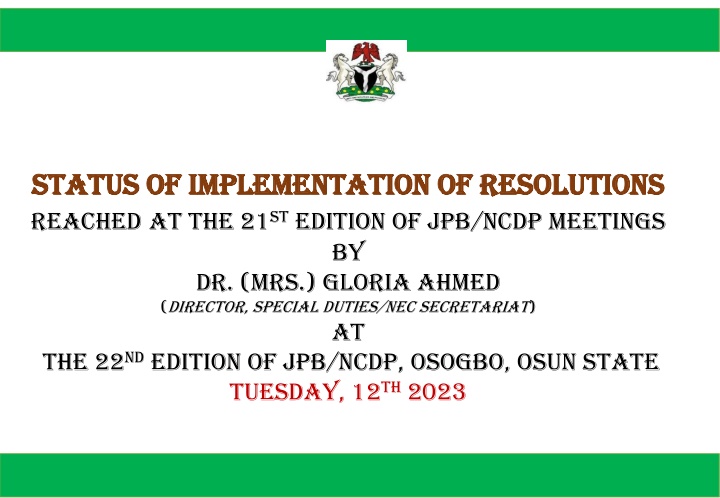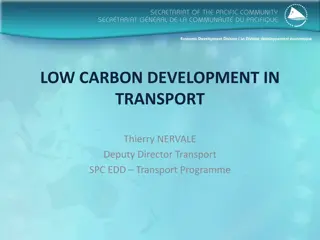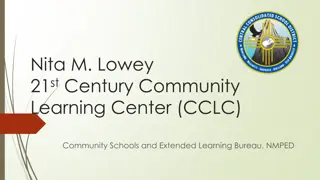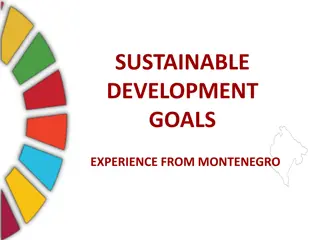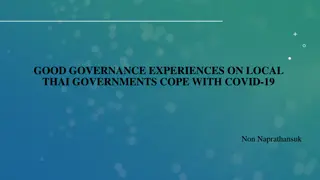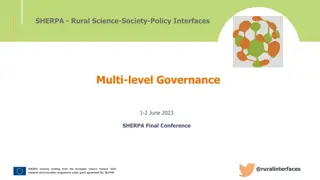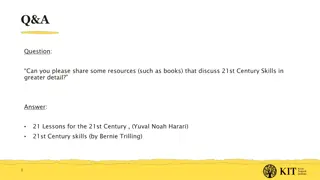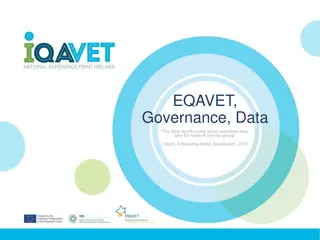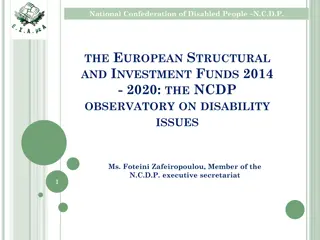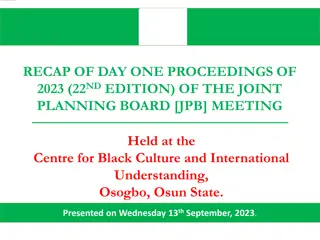Summary of 21st JPB/NCDP Meeting on Good Governance and Sustainable Development
The 21st edition of the Joint Planning Board (JPB) meeting focused on Good Governance and Institutional Capacity for Sustainable National Development. Held in Ebonyi State, the meeting featured technical discussions and policy proposals to enhance Nigeria's economic management. With sessions on strengthening institutions, infrastructure development, and food system transformation, the meeting aimed to address the nation's socio-economic challenges. Key resolutions were reached and monitored across various states, signifying a step towards effective governance and development.
Download Presentation

Please find below an Image/Link to download the presentation.
The content on the website is provided AS IS for your information and personal use only. It may not be sold, licensed, or shared on other websites without obtaining consent from the author.If you encounter any issues during the download, it is possible that the publisher has removed the file from their server.
You are allowed to download the files provided on this website for personal or commercial use, subject to the condition that they are used lawfully. All files are the property of their respective owners.
The content on the website is provided AS IS for your information and personal use only. It may not be sold, licensed, or shared on other websites without obtaining consent from the author.
E N D
Presentation Transcript
Status of implementation of resolutions Status of implementation of resolutions REACHED at the 21STEDITION OF JPB/NCDP MEETINGS BY DR. (MRS.) GLORIA AHMED (Director, Special Duties/nec secretariat) AT THE 22NDEDITION OF JPB/NCDP, OSOGBO, OSUN STATE TUESDAY, 12TH2023
Introduction The 21st edition of the Joint Planning Board (JPB) meeting organized by then Federal Ministry of Finance, Budget and National Planning (FMFBNP) and hosted by Ebonyi State Government, held from the 6th 7th of April, 2022 at the New Executive Council Chambers, Government House, Abakaliki, Ebonyi State. The theme of the meeting was Good Governance and Institutional Capacity: Pathways to Sustainable National Development . The main objective of the meeting was for critical Stakeholders and delegates to engage in technical discussions on pathways to sustain national development in Nigeria as well as propose policies for optimal approach for improving the Nation s economic management process. It also provided a platform for discussions on how to steer the ship of governance towards meeting the needs and aspirations of the citizenry amidst the challenging socio-economic climate. 2
...introduction The meeting was structured into two (2) Technical Plenary sessions and three (3) Panel Discussions. A total of nine (9) papers were presented by Resource Persons, including a lead paper on Unlocking the Nigeria Economy Development Plan (2021 2025): The Implementation Strategies . The Technical Sessions focused on the following sub-themes: a) Strengthening Institutional Capacities for Good Governance in Nigeria; b) Infrastructure Development and Industrialization in Nigeria: Options for Nigeria; and c) National Food System Transformation: A Strategy to Accelerate the Achievements of SDGs within the National Development Plan. through the National 3
...introduction The JPB meeting was conducted using a hybrid format (physical and virtual). 531 delegates (522 physically and 9 virtually) drawn from 29 States of the Federation namely: Abia, Adamawa, Akwa Ibom, Anambra, Bauchi, Benue, Borno, Delta, Ebonyi, Edo, Ekiti, Enugu, Gombe, Imo, Jigawa, Kebbi, Kogi, Kwara, Lagos, Niger, Ogun, Ondo, Osun, Oyo, Plateau, Rivers, Taraba, Yobe and Zamfara States participated. Others in attendance included 12 State Hon. Commissioners, 50 State Permanent Secretaries, 115 representatives from Federal MDAs, 83 delegates from State Ministries, Departments and Agencies (MDAs), Representatives of Development Partners, Organized Private Sector, Academia, Civil Society Organizations and the Media. Arising from the presentations, exhaustive discussions and deliberations, delegates unanimously agreed on some Resolutions which were monitored across the following States 35 States that filled the monitoring template: Abia, Adamawa, Enugu, Kaduna, Ogun, Taraba, Yobe, Sokoto, Kano, Gombe, Kebbi, Kwara, Ekiti, Zamfara, Bauchi, Anambra, Katsina, Niger, Kogi, Ondo, Bayelsa, Cross River, Ebonyi, Akwa Ibom, Rivers, Edo, Oyo, Plateau, Delta, Osun, Borno, Benue, Imo, Jigawa and Nasarawa. 4
Status of Implementation Across the States Below are the Resolutions and status of implementation: S/N RESOLUTIONS STATUS OF IMPLEMENTATION State of the Economy: Unlocking through the National Development Plan (2021 - Implementation Strategies 1 The Ministry of Budget and Economic Planning is currently programmes and policies from the NDP 2021 2025 and available information indicates that this has been cascaded to most States Development Example of such states are Akwa Ibom, Cross River, Gombe, Ondo, Ekiti etc. implementing the Nigeria Economy 2025): The Plans. States should submit completed template on the status of implementation of the JPB/ NCDP meetings resolutions on/ before 3 months to the next JPB/NCDP meetings, to enable the implementation and report appropriately Recall we agreed that the JPB Secretariat will forward templates to States to monitor implementation of previous JPB resolutions three months to the next JPB, But this was delayed due to the electioneering period and change of Government across all levels 2 Secretariat track 5
status of implementation across the States 3 Open Government Partnership: Co-creation as a strategic mechanism for National Public Reform - A case for Open Government Partnership (OGP) across the States ` Submissions from States indicate that only 25 States + FCT States have signed up. We remaining States to sign up. I can be contacted for further details . The following states are yet to sign up: Yobe, Borno, Lagos, Rivers, Akwa- Ibom, Bayelsa, Ogun, Osun, Benue, Katsina and Kwara appeal to the 4 Government Business, Smart Technology and Digital Economy i. Both National and Sub-National Governments should introduce Smart Technology and Digital Economy into government businesses; and ii. The Sub-National Governments need to popularize the concept of digital economy Information from States shows that 21 of the 35 States that returned the template, have created innovation and creative centres for the citizens, mostly for the youths and SMEs, which has deepened penetration. technology 5 Infrastructure Development and Industrialization in Nigeria: Options for Nigeria (Federal and State Governments should collaborate with the Private Sector in the execution of key infrastructure projects) Available records from the 35 States indicates that they have keyed into the National Infrastructure Masterplan (NIIMP), working with the Infrastructure Dept of the FMBED. States that have done creditably well on this are Akwa Ibom, Edo, Kaduna, Borno, Adamawa etc. Integrated 6
status of implementation across the States 6 Early Warming System/ Weather and Climate Prediction for Growing Season (National and Sub-National Governments should mainstream Meteorological information into the planning and implementation of agricultural activities to managethe impact of weather-relatedrisks) Submissions from States indicates that only 8 out of the 35 States have done this 7 Transforming Food System through Farm Settlement, Youth and Women Engagement: i. Government at both National and Sub-National levels should encourage regional allocation of resources and introduction of new farm implements to local farmers; ii. The reintroduction of farm settlements should be adopted in the 36 States of the Federation and FCT to create jobs, improve livelihood and reduce poverty No action, based on available submissions industrialization through Operation Feed Yourself for Food Security and Subsistence Farming: i. Federal and Sub-National governments to support Commercial farming through the provision of appropriate farming inputs and equipments; ii. State Governments are encouraged to key into Global Alliance for Improved Nutrition (GAIN) Programme to boost agricultural production to ensure food security iii. States working with relevant stakeholders need to address the challenges of Human resources in the short, medium to long term to promote Operation Feed Yourself Programme; 8 Available records indicate that 35 States have adopted means to ensure food sufficiency, except that they have not keyed into the Global Improved Nutrition (GAIN) programme Alliance for 7
It is pertinent to note that the above status of implementation were curled from submissions of the Thirty Five States. There was no submission from Lagos 8
Conclusion Arising from Reports of the 35 States, it was observed with high level of commendation that all the 35 States have formulated policies that will ensure proper Good Governance and Institutional Capacity, which is a Pathway to Sustainable National Development. I want to specially commend States that submitted their duly completed templates at short notice, which enabled the Secretariat verified their submissions during the field visits. 9
THANK YOU 10
